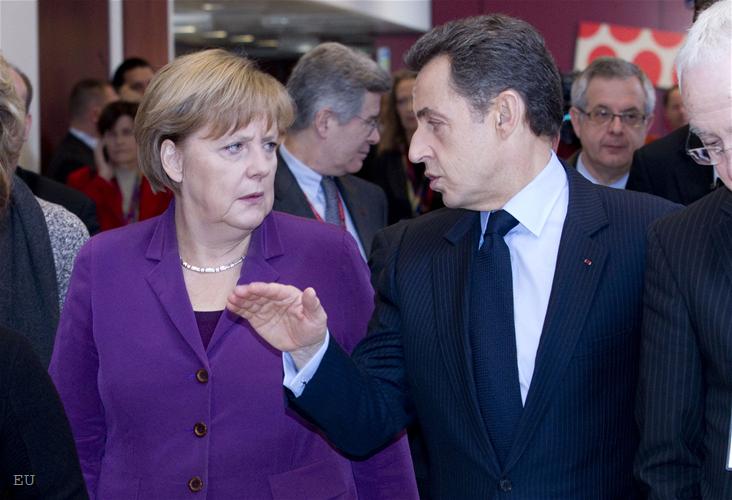The European Council on Growth and Employment - Much Ado About Nothing
Ralitsa Kovacheva, February 1, 2012
 European Commission President Jose Manuel Barroso likes to say that there are 23 million unemployed and 23 million small and medium sized enterprises in the EU, and if each of them would hire one unemployed, the joblessness in the EU will disappear. This example is also often cited by many European leaders - from German Chancellor Angela Merkel to Bulgarian Prime Minister Boyko Borissov. Apart from the ingenious game with figures, however, the measures on growth and employment, approved by the European Council on 30 January, are nothing more than pompous verbiage.
European Commission President Jose Manuel Barroso likes to say that there are 23 million unemployed and 23 million small and medium sized enterprises in the EU, and if each of them would hire one unemployed, the joblessness in the EU will disappear. This example is also often cited by many European leaders - from German Chancellor Angela Merkel to Bulgarian Prime Minister Boyko Borissov. Apart from the ingenious game with figures, however, the measures on growth and employment, approved by the European Council on 30 January, are nothing more than pompous verbiage.
How do we reduce unemployment?
With new papers, mostly. Each Member State must submit a National Jobs Plan, as a part of its National Reform Programme. The implementation of the plans will be subject to enhanced monitoring throughout the European semester. It should include measures to reform labour markets, link labour price to productivity, promote youth employment, provide opportunities for apprenticeships and traineeships for young people, remove barriers in protected sectors.
"We need to keep people in work and create new jobs, including in the 'green economy'. This means taking concrete action to overcome the 'skills mismatch' and the 'geographic mismatch'. It also means reforming labour markets and addressing the cost of labour in relation to productivity."
European Commission President Jose Manuel Barroso has made a presentation on the topic at the European Council, which clearly shows how serious the problem with youth unemployment is in the EU. The average EU level is 22%, the most dramatic is the situation (quite understandable) in Greece and Spain, where nearly half of young people are unemployed. But the situation is not encouraging across the EU too, with the exception of Germany, Austria (the only ones under 10%), the Czech Republic, Slovenia, Denmark and Finland. However, according to the leaders statement, solutions will be sought through more opportunities for internships and practises, as well as through the full use of EURES job mobility portal for finding jobs within the EU.
made a presentation on the topic at the European Council, which clearly shows how serious the problem with youth unemployment is in the EU. The average EU level is 22%, the most dramatic is the situation (quite understandable) in Greece and Spain, where nearly half of young people are unemployed. But the situation is not encouraging across the EU too, with the exception of Germany, Austria (the only ones under 10%), the Czech Republic, Slovenia, Denmark and Finland. However, according to the leaders statement, solutions will be sought through more opportunities for internships and practises, as well as through the full use of EURES job mobility portal for finding jobs within the EU.
For its part, the EU will help countries with the highest levels of youth unemployment by working with them to re-direct available EU funds towards supporting young people find a job or training. Or by “enhancing cross-border labour mobility, through the revision of EU rules on the mutual recognition of professional qualifications”, which, as anyone who has ever tried to understand the requirements for practising a profession in different Member States can imagine, is an enormously intensive and time consuming task, moreover with an unknown end. The same is the case for making "progress on the acquisition and preservation of supplementary pension rights for migrating workers."
A Single Market?
 From the last sentence a thought has started to insinuate itself, which took a clearer shape inbetween the lines devoted to the single market. There, among dozens of pieces of legislation, the needed “rapid” agreement and implementation by member states, lies the following sentence: "progress in structured discussions on the coordination of tax policy issues and the prevention of harmful tax practises in the context of the Euro Plus Pact." I highlight this, because it is obvious that there is no other way than sooner or later to put on the table "the sacred cows” of the national prerogatives such as taxes, social systems, pension systems and education. Until member states are entitled to determine their own policies in these areas and use them as hidden forms of protectionism, the single market will remain a beautiful but distant dream.
From the last sentence a thought has started to insinuate itself, which took a clearer shape inbetween the lines devoted to the single market. There, among dozens of pieces of legislation, the needed “rapid” agreement and implementation by member states, lies the following sentence: "progress in structured discussions on the coordination of tax policy issues and the prevention of harmful tax practises in the context of the Euro Plus Pact." I highlight this, because it is obvious that there is no other way than sooner or later to put on the table "the sacred cows” of the national prerogatives such as taxes, social systems, pension systems and education. Until member states are entitled to determine their own policies in these areas and use them as hidden forms of protectionism, the single market will remain a beautiful but distant dream.
This impression is reinforced by the list of topics where it is necessary to achieve harmonisation between practises in different EU countries: standardisation, energy efficiency, simplification of accounting requirements, simplification of public procurement rules; e-commerce, patents, services, energy market.
23 million small and medium enterprises (SMEs)
The main tool in support of SMEs should be the European Structural Funds, according to the leaders' statement. Within the current financial framework (2007-2013), there are over 82 billion euros that have not yet been allocated, according to the Commission. As Commission President Jose Manuel Barroso said, SMEs could use money from the structural funds as a guarantee for loans they could get in the banks.
"Better mobilising structural funds by speeding up the implementation of existing programmes and projects, where appropriate re-programming money and rapidly committing money not yet allocated to specific projects, concentrating on growth enhancement and job creation."
Another measure to support SMEs is also increasing support from the European Investment Bank for SMEs and infrastructure; rapidly examining the Commission's proposals on "project bonds" to stimulate private financing of key infrastructure projects; ensuring better access to venture capital across Europe by agreeing the EU passport; promoting the role of the Progress Micro finance Facility in support for micro enterprises; improving the business environment for SMEs by reducing unjustified administrative and regulatory burden.
As if to underline what is missing in the leaders' statement Re-define think-tank published an alternative Growth Compact, by analogy with the ‘Fiscal Compact’, agreed at the European Council. Not surprisingly, the first condition in the Growth Compact is member states not to be punished by the fiscal compact when it comes to public investment in 2012-2015. And as more public investment requires additional budget revenues, Re-define offers several options: introduction of a European carbon tax; "a Union co-ordinated but Member State implemented" levies on bank balance sheets and "Financial Transaction Taxes along the lines of the UK based Stamp Duty", to include bonds and derivatives markets; increased taxes on land, property and wealth.
At the same time, in order to use the 80 billion euros from the EU budget in a most efficient way, analysts suggest the Commission to suspend the co-financing requirements for programme countries, in particular for investment projects, as well as to accelerate plans for floating 'project bonds' to support infrastructure investments in transport, telecommunications and green energy. To better support SMEs, the effective usable resources of the European Investment Bank should be immediately increased by 50%, the paid-in capital - by 20 billion euros and individual share of callable capital of member states by 50%. The EIB should "more than triple the capital paid into to the European Investment Fund from the current level of 484 million to 1,500 million", analysts argue.
 In reality, however, the commitments of EU member states are much less specific, without having any financial dimension, but mostly – carefully circumventing the most sensitive issues. What national solutions will be offered and how they will be evaluated by the Commission (as well as the other member states) will become clear in June. Until then we will keep suspecting that the only reason for the Special European Council on growth and employment was to respond to criticism of a budgetary discipline obsession. Ultimately, the cynical conclusion is that the fiscal pact is a fact, and as to the rest, let every tub stand on its own bottom.
In reality, however, the commitments of EU member states are much less specific, without having any financial dimension, but mostly – carefully circumventing the most sensitive issues. What national solutions will be offered and how they will be evaluated by the Commission (as well as the other member states) will become clear in June. Until then we will keep suspecting that the only reason for the Special European Council on growth and employment was to respond to criticism of a budgetary discipline obsession. Ultimately, the cynical conclusion is that the fiscal pact is a fact, and as to the rest, let every tub stand on its own bottom.
 | © euinside
| © euinside | © EU
| © EU